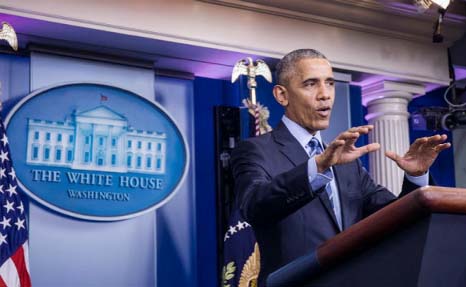
AFP, Washington :
President Barack Obama on Saturday spoke about the importance of ordinary people working together for change in a preview of the farewell address he will deliver in Chicago next week.
Many departing US presidents have given farewell addresses as they leave office, a tradition dating to the first US president, George Washington, in 1796.
“The running thread through my career has been the notion that when ordinary people get involved, get engaged, and come together in collective effort, things change for the better,” Obama said in his weekly radio address.
“That’s the belief at the heart of this precious American experiment in self-government. It’s what gives work and purpose to each new generation.”
Obama urged listeners to “remember that America is a story told over a longer time horizon, in fits and starts, punctuated at times by hardship, but ultimately written by generations of citizens who’ve somehow worked together, without fanfare, to form a more perfect union.”
He then highlighted some of the accomplishments during his presidency, which include sweeping improvements to health care coverage, bringing home troops from Iraq and Afghanistan, reaching a nuclear deal with Iran, and bringing “the world together around a climate agreement.”
Nevertheless “our work is and will always be unfinished. That’s the imperative of citizenship – the idea that with hard work, people who love their country can change it.”
The Hawaii-born Obama said he chose to deliver Tuesday’s farewell address in Chicago “not only because it’s my hometown – where I met my wife and we started a family – but also because it’s really where my career in public service began.”
The White House said it was the first time a president returns to his hometown to deliver such a speech.
Democrat Obama hands the presidency over to Republican Donald Trump in Washington on January 20.
Meanwhile, a Rastafarian prophet, a former Taliban captive and thousands of minor drug traffickers have one thing in common: Their names have been submitted to President Barack Obama for clemency before he leaves office in two weeks.
Some US presidents have used this regal power of leniency in a pointed way near the end of their term in office.
On the last day of his term in 2001, Democratic president Bill Clinton granted pardon in a highly controversial move to late fugitive trader Marc Rich, whose ex-wife had been a major donor to Democrats.
Sixteen years later, Obama is fielding pressure from all sides to grant unlikely pardons or commutations of sentences to people whose supporters say have been unjustly sentenced or sought out by the justice system.
Among them is Bowe Bergdahl, a US Army sergeant held captive for five years by the Taliban before his release in a prisoner swap, who is due to be court-martialed for desertion.
Leonard Peltier, a Native American activist convicted for the 1975 deaths of two FBI agents in what his supporters say was a setup, is also hoping to enjoy Obama’s good graces.
President Barack Obama on Saturday spoke about the importance of ordinary people working together for change in a preview of the farewell address he will deliver in Chicago next week.
Many departing US presidents have given farewell addresses as they leave office, a tradition dating to the first US president, George Washington, in 1796.
“The running thread through my career has been the notion that when ordinary people get involved, get engaged, and come together in collective effort, things change for the better,” Obama said in his weekly radio address.
“That’s the belief at the heart of this precious American experiment in self-government. It’s what gives work and purpose to each new generation.”
Obama urged listeners to “remember that America is a story told over a longer time horizon, in fits and starts, punctuated at times by hardship, but ultimately written by generations of citizens who’ve somehow worked together, without fanfare, to form a more perfect union.”
He then highlighted some of the accomplishments during his presidency, which include sweeping improvements to health care coverage, bringing home troops from Iraq and Afghanistan, reaching a nuclear deal with Iran, and bringing “the world together around a climate agreement.”
Nevertheless “our work is and will always be unfinished. That’s the imperative of citizenship – the idea that with hard work, people who love their country can change it.”
The Hawaii-born Obama said he chose to deliver Tuesday’s farewell address in Chicago “not only because it’s my hometown – where I met my wife and we started a family – but also because it’s really where my career in public service began.”
The White House said it was the first time a president returns to his hometown to deliver such a speech.
Democrat Obama hands the presidency over to Republican Donald Trump in Washington on January 20.
Meanwhile, a Rastafarian prophet, a former Taliban captive and thousands of minor drug traffickers have one thing in common: Their names have been submitted to President Barack Obama for clemency before he leaves office in two weeks.
Some US presidents have used this regal power of leniency in a pointed way near the end of their term in office.
On the last day of his term in 2001, Democratic president Bill Clinton granted pardon in a highly controversial move to late fugitive trader Marc Rich, whose ex-wife had been a major donor to Democrats.
Sixteen years later, Obama is fielding pressure from all sides to grant unlikely pardons or commutations of sentences to people whose supporters say have been unjustly sentenced or sought out by the justice system.
Among them is Bowe Bergdahl, a US Army sergeant held captive for five years by the Taliban before his release in a prisoner swap, who is due to be court-martialed for desertion.
Leonard Peltier, a Native American activist convicted for the 1975 deaths of two FBI agents in what his supporters say was a setup, is also hoping to enjoy Obama’s good graces.

